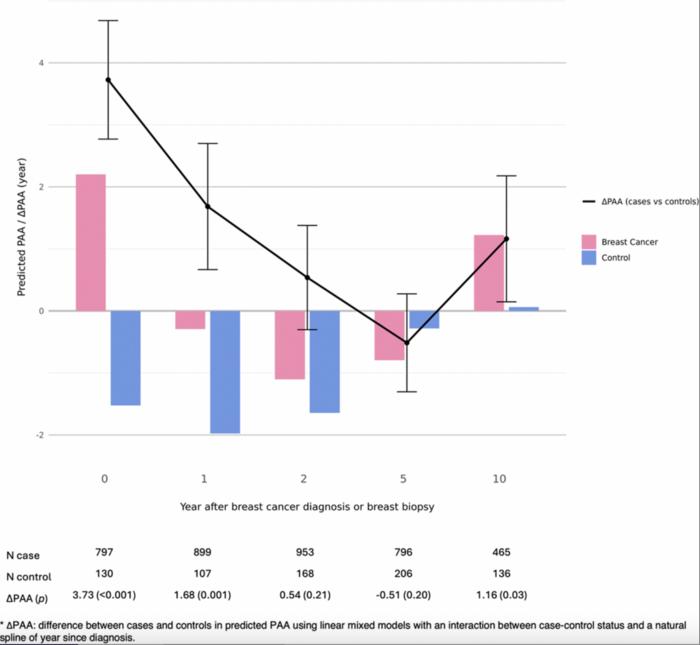
Breast cancer has become one of the most prevalent health challenges faced by women across the globe. As advancements in medical technology and therapeutic interventions have allowed for improved survival rates, researchers are beginning to uncover a concerning side effect that has emerged in the wake of these medical breakthroughs: accelerated aging among breast cancer survivors, as highlighted in a recent study published in the esteemed journal Aging. This pivotal research sheds light on how the biological impact of breast cancer and its treatment can lead to aging markers that may linger long after the initial diagnosis and treatment have passed.
The study, led by a distinguished team from Vanderbilt University, specifically by Cong Wang and Xiao-Ou Shu, employs a groundbreaking approach to quantify accelerated aging through the lens of Phenotypic Age Acceleration (PAA). This method serves as a sophisticated biological marker for estimating an individual’s aging rate based on comprehensive blood test analyses. The utilization of PAA provides a robust framework for understanding the multifaceted biological changes that breast cancer patients experience compared to their cancer-free counterparts.
Analyzing data collected from over 1,200 breast cancer patients and a significant control group of 429 cancer-free individuals, the research team found that breast cancer survivors exhibited significantly elevated levels of PAA at the time of their diagnosis. The implications of these findings are profound, suggesting that the treatment protocols, while essential for combating cancer, could inadvertently usher in a series of biological changes that predispose survivors to accelerated aging. Notably, these effects extend well beyond the completion of treatment, with some survivors showing signs of biological aging continuing for up to a decade post-diagnosis.
A particularly striking element of this study is the correlation drawn between tumor characteristics and the degree of accelerated aging observed in patients. Women diagnosed with advanced-stage tumors, especially those classified as Stage III or IV, displayed the most pronounced levels of aging acceleration. This observation raises critical questions regarding not only the effectiveness of treatment modalities but also the overarching long-term health strategies employed for managing breast cancer. The dosage and type of therapies employed can play a substantial role in modulating these biological effects, rendering the choice of treatment strategies paramount.
Furthermore, the findings delineate a stark differentiation in the biological impacts of various treatment modalities. Chemotherapy, although an essential component of many cancer treatment regimens, was specifically associated with a substantial surge in PAA one year following diagnosis. This suggests that while chemo regimens aim to eliminate cancerous cells, they may also influence the body’s aging process, exacerbating the biological toll on survivors. In contrast, endocrine therapies, known for their role in hormonal modulation, were found to impose long-lasting effects that persisted even ten years after treatment, highlighting the significant role that hormonal balance plays in the aging process.
Interestingly, not all therapeutic interventions appear to accelerate aging to the same extent. Surgical interventions and radiation therapies did not correlate as strongly with increased aging markers. This anomaly suggests that localized treatments may afford some protective measures against the systemic effects on aging, emphasizing the necessity for a nuanced understanding of how different types of cancer treatments can confer varying impacts on long-term health outcomes.
The significance of these findings underscores the necessity for a comprehensive approach to post-treatment surveillance among breast cancer survivors. As the number of individuals living beyond a breast cancer diagnosis continues to climb, necessitating a re-evaluation of how survivorship is defined and managed becomes imperative. Continuous monitoring and research into how different cancer treatments affect aging could prove invaluable in shaping future care strategies aimed at mitigating these adverse effects.
Efforts to identify lifestyle modifications or adjunct therapies could play a vital role in addressing the accelerated aging phenomenon observed in these survivors. This could potentially include investigating dietary changes, exercise interventions, or novel pharmaceuticals aimed at preserving youthfulness or counteracting the aging processes triggered by cancer treatments.
The findings raised by this research act as a clarion call for both healthcare providers and patients alike. As the medical community strives to minimize cancer-related health burdens, understanding the interplay between cancer therapies and aging becomes increasingly critical. The quest to optimize treatment plans, finding a balance between aggression in defeating cancer and safeguarding long-term health, must remain a priority in the evolving landscape of cancer care.
In conclusion, this study highlights the intricate relationship between breast cancer treatment and aging, suggesting that healthcare approaches should expand beyond immediate survival metrics to consider the broader implications of treatment on aging. As breast cancer survivors navigate their post-diagnosis lives, the lingering effects of treatment should not be overlooked in the quest for holistic care. The data presented by this research sets a foundation for future explorations and interventions that can pave the way for a healthier, more robust approach to life after cancer.
Subject of Research: Accelerated aging in breast cancer survivors
Article Title: Accelerated aging associated with cancer characteristics and treatments among breast cancer survivors
News Publication Date: March 7, 2025
Web References: https://www.aging-us.com/
References: DOI 10.18632/aging.206218
Image Credits: © 2025 Wang et al.
Keywords: accelerated aging, PhenoAge, breast cancer, survivors
Tags: accelerated aging in breast cancer survivorsadvancements in breast cancer treatmentaging markers in cancer survivorsbiological markers of aging in womenhealth challenges faced by breast cancer survivorsimpact of cancer therapies on agingimproving survival rates in breast cancerlong-term effects of breast cancer treatmentPhenotypic Age Acceleration in cancer patientspsychological effects of breast cancer treatmentstudies on women’s health and agingVanderbilt University breast cancer research





